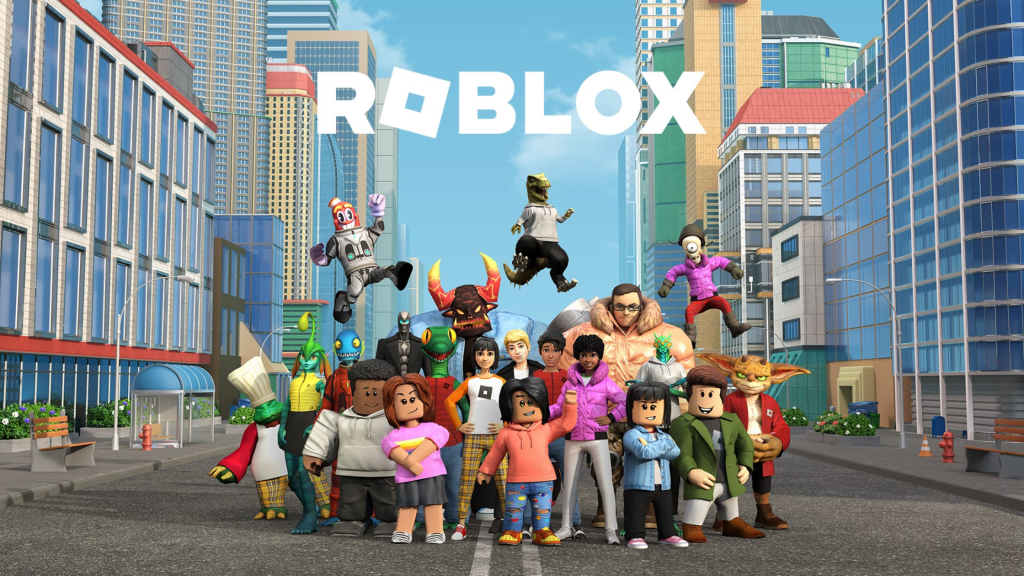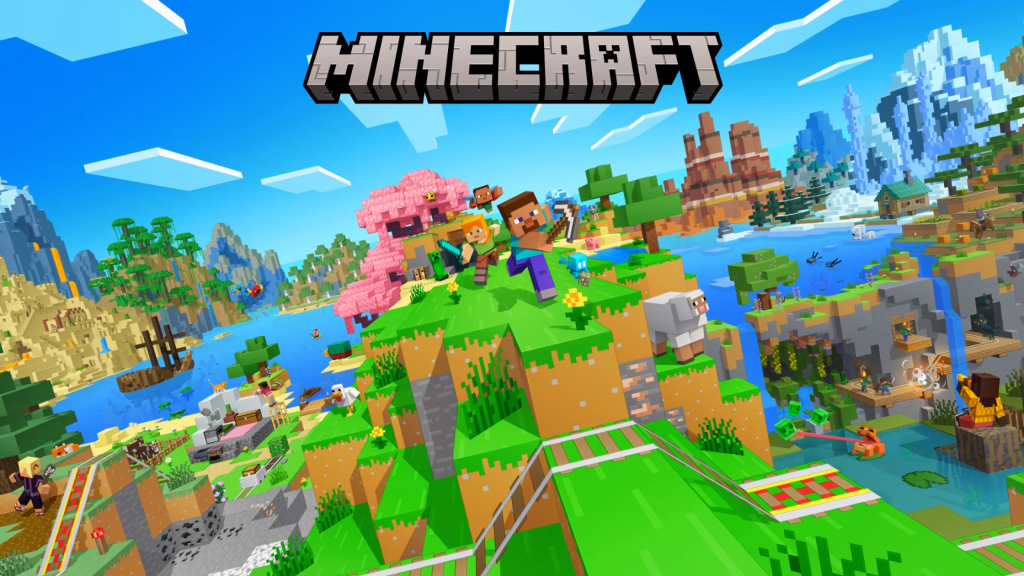This 2025 International Youth Day just been, we’re homing in on prevalent scams that are affecting popular online games for kids! In particular, we’ll be focusing on Roblox scams, Minecraft scams and Fortnite scams!
We know it’s more often than not a parent’s card connected to their child’s gaming account. That’s why we’ve put together this handy blog which lists common scams on each online game and details how exactly they work. If anything, it serves as a perfect opportunity to initiate a family discussion around online safety tips for kids. That way, you can avoid any unexpected transactions on your credit card in the future!

Roblox
Roblox has been around since 2006 and it has become a hugely popular gaming choice for kids, mostly under 16 years of age. It’s got a pretty distinctive look, with characters giving off a boxy and animated appearance. Some might even say it slightly resembles Lego! It’s like a virtual playground rather than a single game. Kids can play a wide variety of user-created games, or even build their own to share with other players.
Roblox fake trading scams
Like all of the online games for kids that we’ll be covering in this blog, trading scams are probably the most prevalent. In this Roblox scam players will trick victims into giving up Robux (the games digital currency) in exchange for something else.
Roblox has official system features, one their “trade feature” and the other their “selling feature”. Any trades or deals made outside of these features are unofficial and therefore suspicious of intent.
Some examples of suspicious trades include:
- If another player requests to “borrow” your account or items or even suggests to “lend” their own.
- Making a trade where the other player makes you go first.
- When another player offers to sell or trade for you on the condition they have access to your accounts and items.
If a trade feels risky, it probably is. So don’t risk it and opt out!
Free Robux generator scams
“Free Robux generator” scams can appear anywhere online, from YouTube videos to links in Roblox games and even in search results that rank high on the search engine results page.
These “free generators” will always result in your account, your Robux and your other items being stolen. Or in some cases, Malware being loaded onto your device. Unfortunately, there is no such thing as free Robux, free memberships, tricks or codes. So if a shady website or pop-up ad is promising you any of these freebies, walk away!
Buying and selling experiences
A Roblox “experience” refers to a user-created game or virtual world that is generated using the Roblox studio. They can be owned by one individual user, or a group of users.
Unlike the trading and buying of other stuff, Roblox has no official way to buy or sell experiences. And, since there is no official system, Roblox suggests not giving other players Robux or any other items in exchange for an experience.
Usually, a scam will start when a scammer offers to buy or build experiences for victims on the condition that they provide access to their account, aka providing login details. This often results in the scammer stealing other items, Robux, and ultimately taking over the victim’s account.
Spam chain mail scams
This particular Roblox scam creates a sense of urgency and pressures the victim by strongly implying something terrible will happen to the them and their account should they not share a circulating message. The message will read something like, “Forward this or something bad will happen”.
This is obviously a hoax. Roblox has no policies or features that would require such a thing to avoid facing “negative consequences”. These messages are designed to spread malware using malicious links and could result in stolen data.
It’s also worth noting that if you do forward along messages like these, your account could get a legitimate warning from Roblox themselves for spamming.

Minecraft
Minecraft was initially released in 2009 and was created by Markus Persson, also known as Notch. Explained simply, it’s a sand box game where players can build, explore and survive in an iconic pixelated terrain. It’s seen as one of the more beneficial online games for kids, thanks to its educational value. It’s even been used in schools! There are five different game modes that players can choose from. Survival mode, hardcore mode, creative mode, adventure mode and spectator mode.
Fake Minecraft app scams
Recently, an investigation found 80 fake Minecraft mobile apps on Google’s Play Store that were downloaded approximately a whopping million times!
These malicious apps will aim to do a number of things. They spam users with ads, redirect users to shady websites, and/or spread malware that’s main purpose is to steal important information and data from the victim.
Our online safety tips for kids, when it comes to downloading applications, include the following.
- Only download from trusted sources. (Apple’s app store, Google’s Play Store, Microsoft Store etc.…)
- Check out reviews and app permissions before you hit install.
- Keep your device up to date so it has the latest security software.
- Ensure you have a reputable anti-virus loaded onto your device. We recommend Malwarebytes!
Minecraft phishing scams
Since Microsoft owns Minecraft, scammers will often send out phishing emails that claim to come from the reputable tech company.
These phishing emails can allege a number of things. From account issues to prompting the recipient to update.
These emails will likely include malicious links that either spread malware or take you to fake websites or payment portals. You will often be prompted to enter sensitive information, such as your login details or even financial details, ultimately resulting in money loss, account takeover or virus infections.
We’ve put together some tips for parents and kids to help spot phishing email scams. While younger children might not have their own email accounts, scams can still land in a parent’s inbox. So, both kids and parents could be tricked if they don’t know what to look for. Here’s what to keep an eye on.
- If you hover your cursor over the email and the hand pointing icon appears, this means the entire email is one image and could have something malicious linked.
- Poor spelling and grammar
- Not personalised. Doesn’t address you by name.
- Unexpected or unasked for.
- Includes strange links or addresses. Legitimate ones should end in mojang.com, minecraft.com, minecraft.net or microsoft.com.
- Names or logos might not look quite right.
If you’ve checked all these points and you’re still not 100% confident, go directly to the Minecraft website or Microsoft website. Just log in to your account and you’ll be able to see if there are any new notifications or pending account updates available.
Minecraft fake discord server scams
A popular Minecraft scam is when scammers pretend to need a teammate and invite users to a fake discord server that looks official.
Discord is a communication platform where users can speak to other users using text, voice or even video. People often use it to join “servers,” which are like group chat rooms for specific games or communities, so they can strategise, share updates, or just hang out and talk with friends who enjoy the same games.
In order to “join in as a teammate” via Discord, the victim is made to “verify” their account and tricked into giving up login details and a one-time code. What the victim doesn’t know is, this “one-time code” is actually for a password reset so the scammer can gain complete access to their account.
Some online safety tips for kids regarding Discord servers:
- Don’t talk to random people asking you to “verify your account” on Discord. (If you do, don’t join their server)
- If you’ve joined the server, don’t complete the verification if they ask for your Microsoft email or a one-time code. Real Minecraft servers will never ask for these.
- Stay cautious and do some research if you’re not 100% confident in the legitimacy of the server. Try googling what the scammer requested of you followed by the word “scam”. In this case “Minecraft Discord verification scam”.
For more advice on Discord scams, click here to read Discord’s official tips!

Fortnite
Fortnite was released in 2017 and is an online multiplayer shooting game. It has a lot of different modes that players can choose from, such as Save the World, Lego and Creative. The most popular online games for kids being Fortnite Battle Royale. This is where 100 players enter an online game with the goal of being the last individual or group standing.
Fortnite fake trading scams
A big part of the appeal of Fortnite, is the buying, earning and collecting of skins, features and items. Fortnite “skins” are outfits or costumes that a player’s character will wear in the game. Features or items can be anything from free battle passes to cosmetics, to pickaxes (used for gathering resources in Fortnite).
Several of these skins and features are not for sale in Fortnite’s online store, but are only available based on a rewards system and other accomplishments. Because these items are so in demand, some players may choose to buy and trade for user accounts that have the items they are after.
As you can probably guess, the victim of this Fortnite scam will either pay real-world money using payment methods like Apple Pay or PayPal, or trade V-Bucks (Fortnite’s digital currency) or even their own account in exchange for the scammer’s account with its coveted skins and features. In the end, the scammer will block the victim after getting payment or access to their account. That is, without ever handing over their own account or whatever they promised to trade.
Fortnite free V-Bucks generator scams
Any Fortnite scam centred around the promise of free V-bucks is always likely to catch young Fortnite gamers who want fast money! Often, by offering “free V-Bucks generators” scammers can easily lure kids into providing their parents’ card information and other sensitive information.
Scammers will link these “free V-Bucks” promotions on websites such as YouTube and Facebook, which are platforms that are already pretty loaded with adware. They’ll also strategically promote on videos that are intended for kids. These ads will link to the scammer’s malicious websites, where the child will then be prompted to provide sensitive information.
The best lesson you can teach your kids here, is that there is no work-around for earning V-Bucks and patience is important (probably not what they want to hear!). Whether it is an Epic Game’s employee promising free V-Bucks, or a very genuine-looking ad on YouTube, it’s never legitimate!
Fortnite fake tournament scams
Since competition is a big lure for Fortnite players, scammers have wisely taken advantage of this and started creating fake tournaments.
Scammers will entice players with tournaments that promise considerably large prizes such as V-Bucks, rare items or exclusive skins.
You’ll notice the promotion of these fake events on social media or on untrustworthy websites. Please note, if a tournament is not advertised on Fortnite’s official channels or other trusted e-sports platforms, you’re probably dealing with a scam.
A fake tournament will usually go as follows. The scammer will ask for a small registration fee and/or ask you to register with personal information and account details. They’ll then collect money and sensitive credentials from hundreds of players and vanish before holding the tournament.
The scammer may also get you to download virus-loaded software by claiming that it’s a gaming tool that will improve game play.
Our biggest red flags for a Fortnite fake tournament scam are:
- Promises of large prizes that are “too good to be true”.
- Asking for a small registration fee. Although some legitimate tournaments may have a small playing fee, more often than not, it is free to enter official Fortnite events.
- Asking players to download third-party untrusted software for “better game play”.
Has your little one fallen for a scam affecting popular online games for kids? Don’t deal with the after affects yourself! Geeks on Wheels can help you manage a malware loaded device and get you set up with scam protection to prevent future mishaps having such a nasty roll on affect! We can also help you set up other preventative measures such as parental controls, data backup and two-factor authentication! Just call the Geeks today!